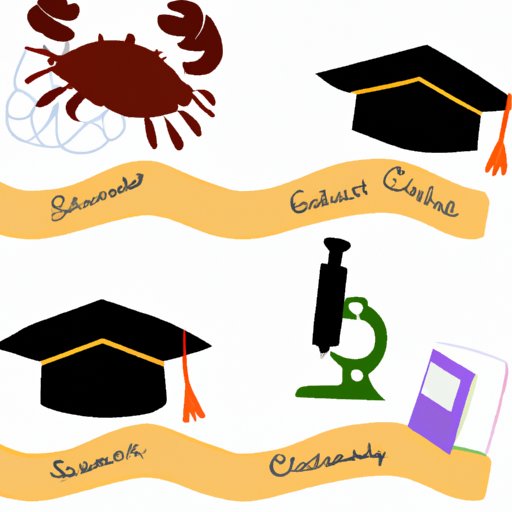Introduction
Marine biology is a field of science that deals with the study of all organisms living in the ocean or other saltwater environments. It is a fascinating and complex area of study that involves the exploration of the physical, chemical, and biological aspects of the marine environment. Marine biologists work in a variety of settings including universities, research facilities, and aquariums. They are responsible for studying and understanding the behavior, interactions, and ecology of aquatic organisms. If you’re interested in pursuing a career in marine biology, it’s important to understand the educational requirements and how many years of college you need to become a marine biologist.

Exploring the Educational Requirements for Becoming a Marine Biologist
In order to become a marine biologist, you must have at least a bachelor’s degree in a field related to marine biology. While there are some entry-level jobs available with just an associate’s degree, most employers require a minimum of a bachelor’s degree. Some of the most common degrees offered in marine biology include: Bachelor of Science (B.S.) in Marine Biology, Bachelor of Arts (B.A.) in Marine Science, Bachelor of Science (B.S.) in Oceanography, and Bachelor of Science (B.S.) in Marine Science and Technology.
The curriculum and coursework for these degree programs vary depending on the institution, but typically include courses in biology, chemistry, physics, mathematics, and ecology. Students may also take courses in marine mammal behavior, fisheries management, and oceanography. In addition to classroom instruction, most programs offer hands-on learning opportunities such as laboratory work and field trips. This type of experiential learning provides students with the opportunity to develop practical skills and knowledge that will be beneficial in their future careers.
Pursuing a degree in marine biology provides students with the opportunity to learn about the dynamic and ever-changing marine environment. They will gain a comprehensive understanding of the relationships between organisms and their environment, as well as the effects of human activities on marine ecosystems. Additionally, they will develop skills in data collection and analysis, problem solving, and communication, which will be invaluable in their future careers.
How Many Years of College Do You Need to Become a Marine Biologist?
The amount of time you need to spend in college to become a marine biologist depends on the degree you choose to pursue. Generally speaking, the following degree programs are available:
Bachelor’s Degree Programs
Most marine biology bachelor’s degree programs take four years to complete. During this time, students will take courses in biology, chemistry, physics, mathematics, and ecology, as well as specialized courses in marine biology. Additionally, students will engage in hands-on learning experiences such as laboratory work and field trips.
Master’s Degree Programs
If you are interested in furthering your studies in marine biology, you can pursue a master’s degree. Master’s degree programs typically take two to three years to complete, depending on the program and the student’s schedule. During this time, students will take courses in advanced topics such as marine ecology, aquaculture, and fisheries management. Additionally, they will have the opportunity to engage in independent research projects and internships.
Doctoral Degree Programs
For those who wish to pursue a career in academia or scientific research, a doctoral degree in marine biology is recommended. These programs typically take four to six years to complete, depending on the institution and the student’s progress. During this time, students will conduct independent research projects and take advanced courses in marine biology and related fields. Additionally, students may be required to complete a dissertation or capstone project.
What Qualifications Are Needed to Pursue a Career in Marine Biology?
In addition to obtaining the necessary degree, there are several qualifications that are needed to pursue a career in marine biology. First, marine biologists must have strong written and verbal communication skills. As they will be interacting with people from a variety of backgrounds, they must also possess excellent interpersonal skills. Additionally, they must have a good understanding of math, science, and technology, as well as the ability to think critically and solve problems. Finally, they must be able to work independently and as part of a team.
In addition to the above qualifications, professional certifications are also beneficial for those pursuing a career in marine biology. Certifications such as the Professional Association of Diving Instructors (PADI) certification and the Marine Mammal Trainer Certification Program (MMTCP) demonstrate knowledge and experience in specific areas of marine biology. Additionally, having these certifications can increase an individual’s chances of landing a job in the field.
Navigating the Academic Path to Becoming a Marine Biologist
Choosing the right school is an important step in pursuing a career in marine biology. There are many schools that offer degree programs in marine biology, so it’s important to research each institution thoroughly before making a decision. Consider factors such as the school’s location, the quality of its faculty, and the types of courses and research opportunities available. Additionally, make sure to check the school’s accreditation status to ensure that the degree will be recognized by employers.
Financial aid is another important factor to consider when choosing a school. Most schools offer a variety of scholarships and grants, as well as loan programs, to help students finance their education. Additionally, some schools may offer tuition discounts or special programs for students who demonstrate financial need. Be sure to research all available options before making a decision.
Finally, internships and research opportunities are essential for those interested in pursuing a career in marine biology. Not only do these experiences provide valuable hands-on learning opportunities, but they also give students the chance to network with professionals in the field. Take advantage of any internship and research opportunities available to you to gain experience and build your portfolio.

The Steps to Take to Become a Marine Biologist: A Closer Look at Education Requirements
Becoming a marine biologist requires a significant commitment of time and effort. The steps to take to become a marine biologist are outlined below:
Step 1: Explore Your Interests
Before committing to a degree program, it’s important to explore your interests and decide if marine biology is the right field for you. Research different areas of marine biology to get an idea of the types of courses and research opportunities available. Additionally, talk to professionals in the field to get their perspective on the industry and the job market.
Step 2: Choose a Major and Degree Program
Once you have decided to pursue a career in marine biology, it’s time to choose a major and degree program. Consider factors such as the types of courses offered, the length of the program, and the cost. Additionally, make sure to research the school’s accreditation status to ensure that the degree will be recognized by employers.
Step 3: Get Experienced and Certified
Gaining experience and obtaining professional certifications can help you stand out in the job market. Seek out opportunities to volunteer, intern, and participate in research projects. Additionally, consider obtaining professional certifications such as PADI and MMTCP to demonstrate your knowledge and experience in specific areas of marine biology.
Step 4: Find Opportunities to Grow Professionally
Continuing to expand your knowledge and experience is essential for a successful career in marine biology. Attend conferences, workshops, and seminars to stay up to date on the latest developments in the field. Additionally, take advantage of any networking opportunities available to you to build relationships with other professionals in the field.
Conclusion
Becoming a marine biologist requires a deep commitment to learning, as well as dedication and hard work. Depending on the degree you choose to pursue, it can take anywhere from four to eight years of college to become a marine biologist. To ensure success in the field, it’s important to gain experience and obtain professional certifications. Additionally, take advantage of any available financial aid options and research the school’s accreditation status before making a decision. With the right education and experience, you can pursue a rewarding and fulfilling career in marine biology.
Summary of Key Points
• To become a marine biologist, you must have at least a bachelor’s degree in a field related to marine biology.
• Bachelor’s degree programs typically take four years to complete, while master’s and doctoral degree programs take two to six years, respectively.
• In addition to the necessary degree, marine biologists must possess strong communication and interpersonal skills, as well as knowledge of math, science, and technology.
• Professional certifications, such as the PADI and MMTCP certifications, can help individuals stand out in the job market.
• Choosing the right school and taking advantage of any available financial aid options are essential for success in the field.
Final Thoughts
Pursuing a career in marine biology requires dedication and hard work, but it can also be extremely rewarding. With the right education and experience, you can make a difference in the world and have a positive impact on our oceans and aquatic ecosystems. So if you’re passionate about marine life and want to make a difference, consider pursuing a degree in marine biology.
(Note: Is this article not meeting your expectations? Do you have knowledge or insights to share? Unlock new opportunities and expand your reach by joining our authors team. Click Registration to join us and share your expertise with our readers.)
